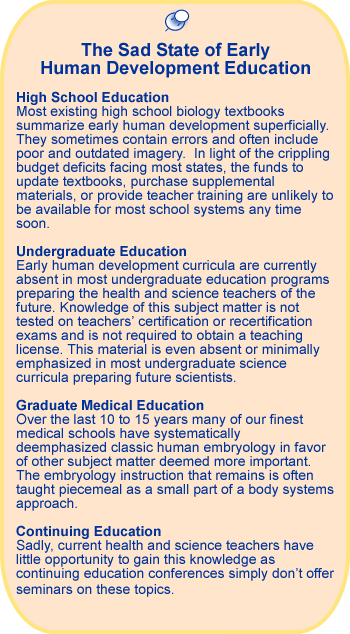|  Understanding
early human development provides a foundation for
understanding: Understanding
early human development provides a foundation for
understanding:
• |
Human development at all ages |
• |
Human anatomy and physiology |
• |
Human disease states including birth defects |
• |
Personal health choices and consequences |
• |
Health promotion for people of all ages (nutrition, exercise, hygiene,
immunizations, dangers of substance abuse and other toxins, etc.) |
• |
The lifelong impact of prenatal health and the vital role of prenatal care |
• |
Effective parenting |
• |
The importance of preserving and protecting the environment |
• |
Breakthroughs in medicine and technology |
• |
The world we live in |
Perhaps J. W. Ballantyne said it best over 100 years
ago when he described his personal journey while studying
human prenatal development:
"I began this work in a spirit of something very
like active curiosity, I have prosecuted it with an
ever-deepening interest, and I have brought it thus
far with the growing sense that I have been dealing
with a subject of tremendous importance for the future
of the [human] race and the individual…"
J. W. Ballantyne, M.D., Manual
of Antenatal
Pathology and Hygiene - The Foetus
(Edinburgh: William Green & Sons, 1902), vii.
 A
Note to Health and Science Teachers A
Note to Health and Science Teachers
Is it time to rethink human development education
for science and health teachers?
We are living in an exciting time when science and
technology provide unprecedented insights
into all aspects of human form and function throughout
the human life cycle. Sadly, the tremendous educational
potential of these advances is tempered by the
disappointing state of early human development
education at every level. (See sidebar)
Future Health and Educational Achievement Begin at (and Before) Fertilization
Many teachers and citizens are concerned with preparing children from disadvantaged backgrounds for
school and toward this end strongly support programs
such as Head Start. The use of tobacco, alcohol, and
other drugs during pregnancy contributes to the number of children who need programs like Head Start. These exposures
are associated with low birth weight, premature birth,
miscarriage, learning disabilities, behavior disorders,
Sudden Infant Death Syndrome, and many other complications.
Substance abuse during pregnancy continues despite
considerable intervention efforts. Effective early
human development education can prevent behaviors
that give children disadvantages and give them
the best head start – good health.
A Shared Duty
Parents, health professionals, and educators have
a duty to promote children’s health even
if school performance is unaffected. Because health
is a major determinant of school performance, promoting
students’ health is an especially vital
concern to educators and every responsible member
of society.
Utilizing Technology
If we are to sharply reduce or eliminate substance abuse during pregnancy,
we must “win over” young women and
men before they are likely to become parents (See Our
Introduction page). A number of studies report that
showing ultrasound images of the fetus to pregnant
women positively affects their behavior in the
areas of smoking and alcohol use. Scientists report
that prenatal imaging promotes prenatal bonding
between the mother-to-be and the fetus and can help
motivate healthy behaviors. The widespread use
of prenatal imaging during and before pregnancy
has the potential to greatly reduce prenatal substance
abuse. Because health and educational achievement
begin at fertilization, intervention efforts should
ideally begin prior to conception and continue
throughout pregnancy and beyond. The middle and high school
years are the perfect time, and the classroom setting with trained health and science educators is the perfect place for this type
of education.
Help is Available
EHD’s cutting edge teaching tools are based
on the findings of human development experts
and can be used by educators to impact and inform students’ choices
regarding a host of health issues including substance
abuse during pregnancy and throughout their lives.
 Rethinking Human Development Education
Rethinking Human Development Education
Most health and science teachers are unfamiliar with
advances in human development research and applications
because such training has been unavailable (see
sidebar). Teachers, we welcome you to our website
and invite you to use our educational and assessment tools,
lesson plans, human development summaries, and
other health information. We hope you will partner
with us by using our materials, embracing our health
education campaigns, providing valuable feedback,
and sharing your insights. Our mission is to equip
you with the tools, knowledge, and confidence you need to
apply the science of human development in a way
which maximally enhances the lifelong health and
educational achievement of every student.
Why Does EHD Emphasize Teacher Training?
An important goal of health and science educators is to impart to their students the knowledge
and decision making skills necessary to maximize lifelong health. EHD is uniquely positioned
to equip and train health and science teachers to achieve this goal.
Educators, we hope you will partner with us by using our materials, embracing our health
education campaigns, providing valuable feedback, and sharing your insights. Our goal is to
equip you with the tools, knowledge, and confidence you need to apply the science of human
development in a way which maximally enhances the lifelong health and educational achievement
of every student.
Additional Resources
EHD has additional resources available
for educators. These resources contain training materials,
teacher training seminars, web-based courses for educators, classroom supplemental materials, and suggestions
for using EHD’s materials in the classroom. Resources
are available for Health and Science curriculum.
|


 Understanding
early human development provides a foundation for
understanding:
Understanding
early human development provides a foundation for
understanding:
 Rethinking Human Development Education
Rethinking Human Development Education